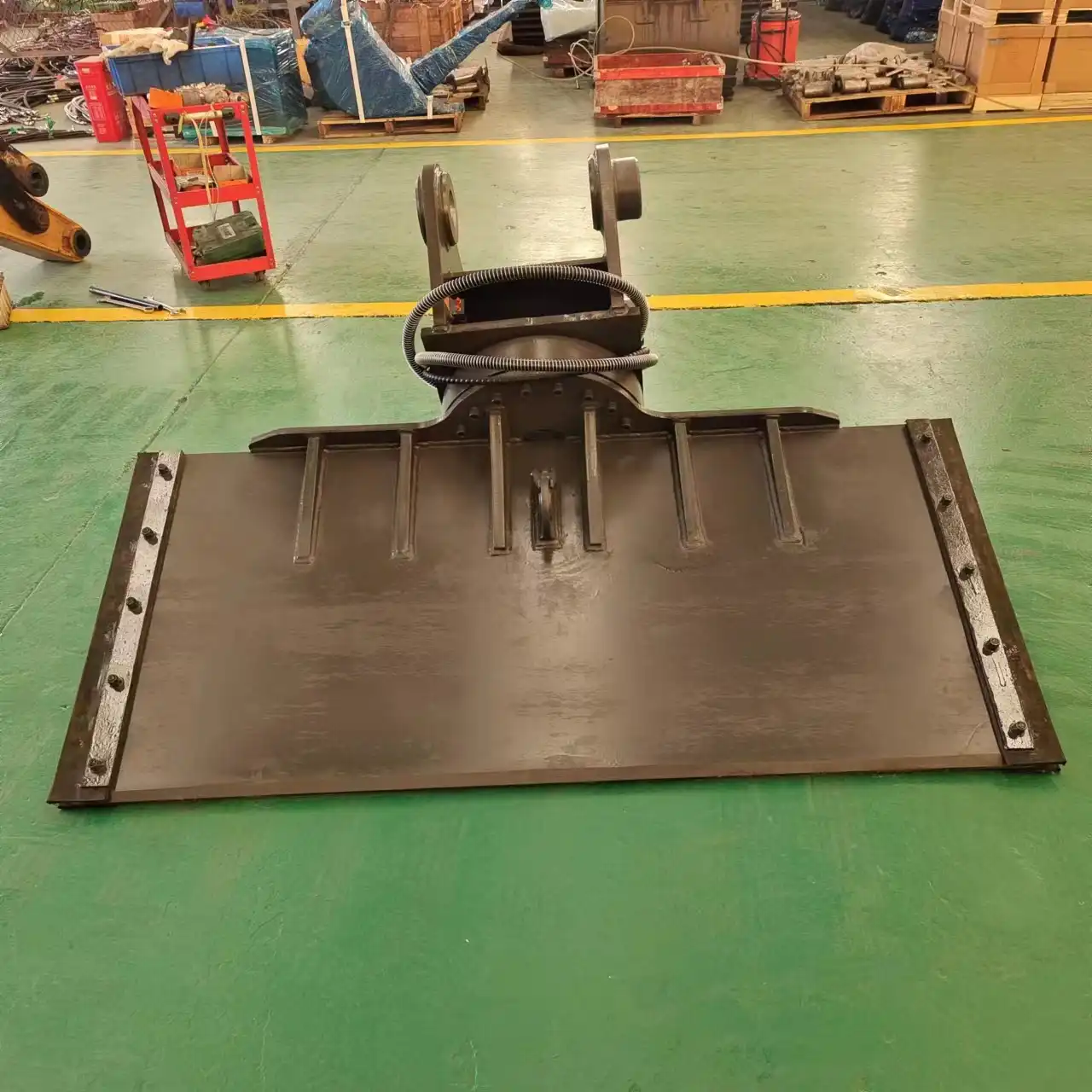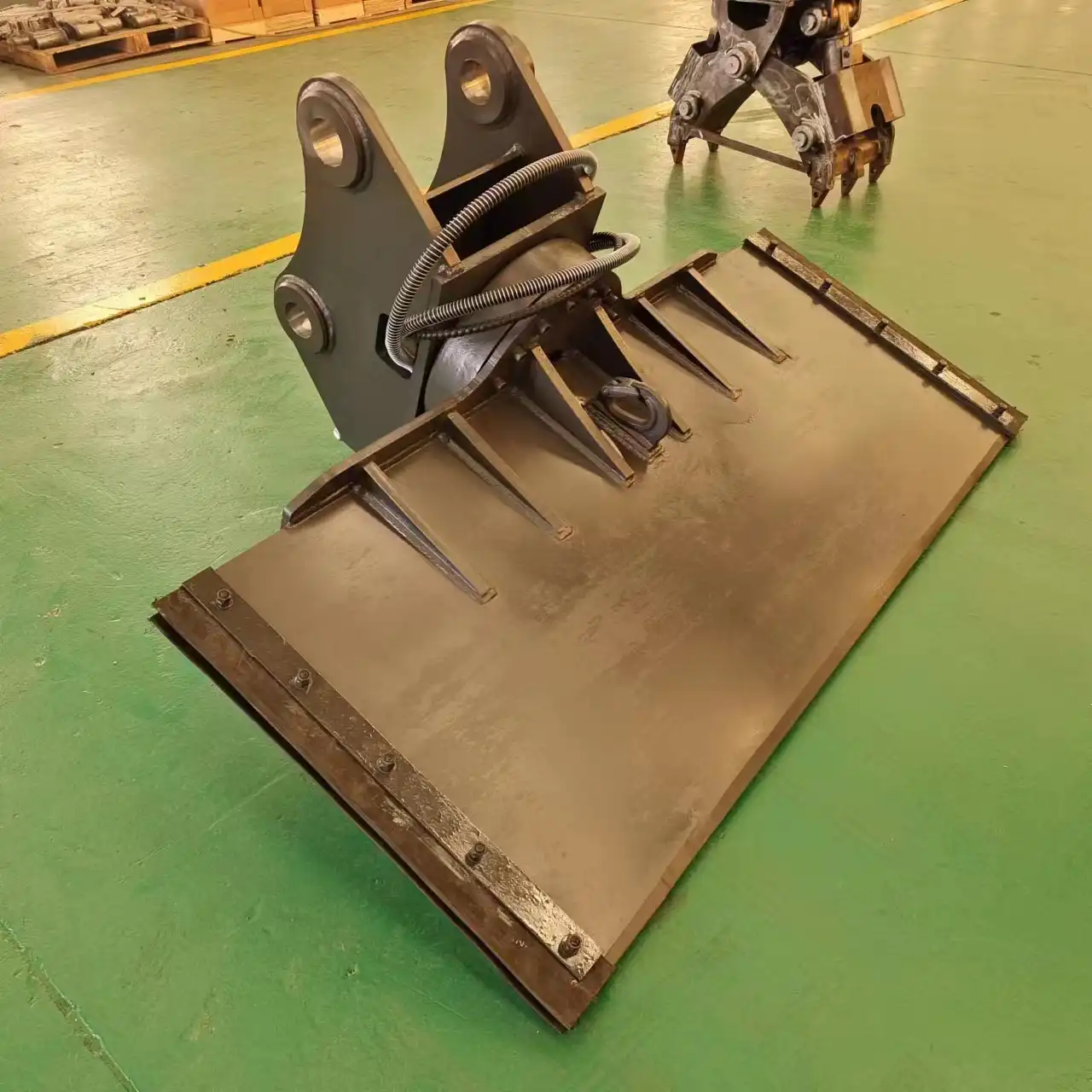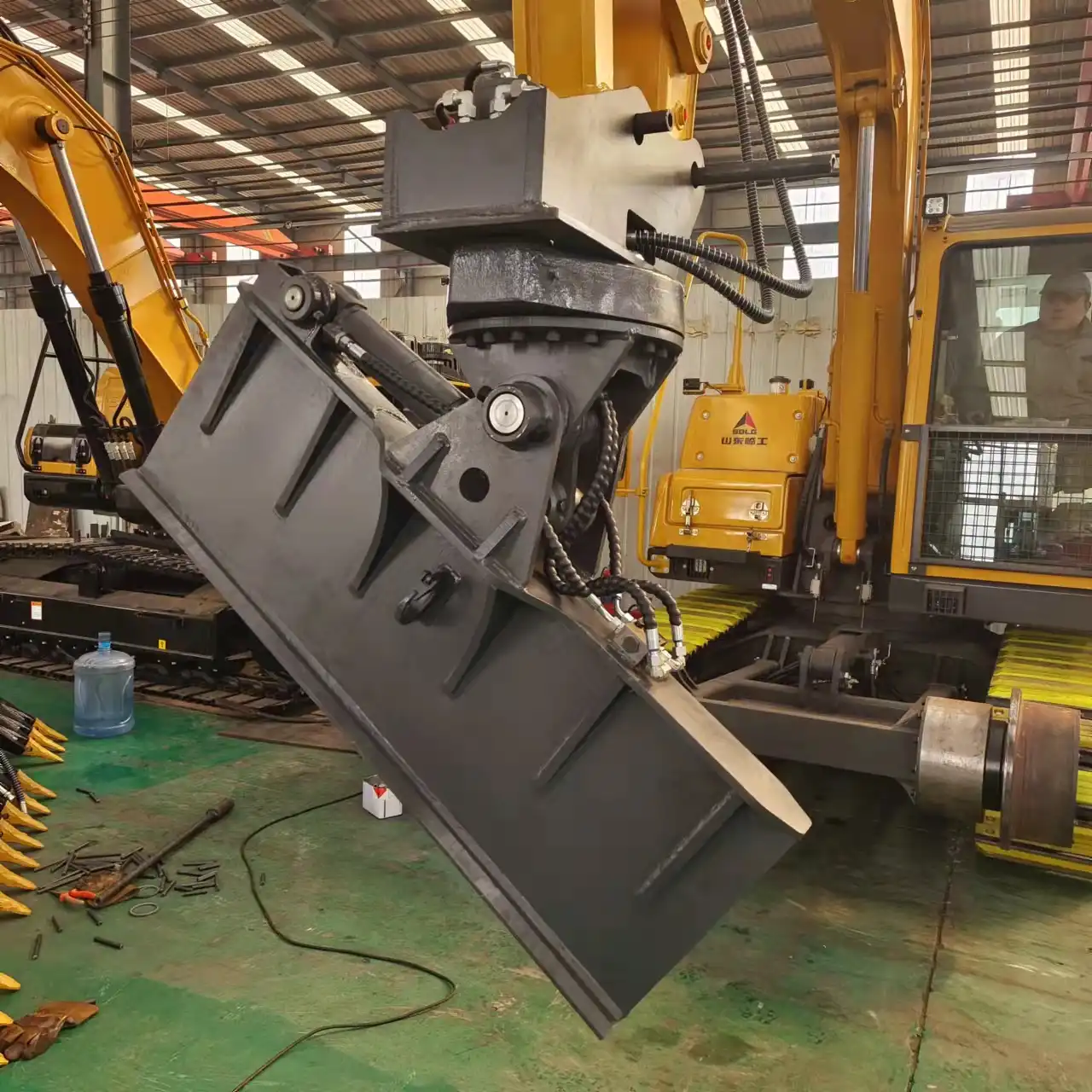What is the lifespan of a rotating scraper made from high-strength steel?
When investing in heavy machinery attachments, understanding the lifespan of your equipment directly impacts your bottom line. An excavator rotating scraper made from high-strength steel typically delivers 5,000 to 8,000 operating hours of reliable service, translating to approximately 3-5 years of productive use under standard working conditions. This impressive durability stems from advanced metallurgical engineering that combines hardened steel composition with precision manufacturing techniques. The robust construction of these attachments ensures they withstand the demanding requirements of earthmoving operations while maintaining consistent performance throughout their operational life. Modern high-strength steel formulations used in rotating scrapers provide enhanced resistance to wear, impact, and environmental factors that traditionally shortened equipment lifespans. Understanding these performance parameters helps construction professionals make informed decisions about equipment procurement and operational planning.

Usage Intensity
The operational demands placed on your rotating scraper significantly influence its service life. Heavy-duty applications involving rocky terrain, abrasive materials, and continuous operation naturally accelerate wear patterns compared to lighter earthmoving tasks. Understanding these usage patterns helps operators maximize equipment value while planning maintenance schedules effectively.
Daily Operating Hours
Construction teams operating their excavator rotating scrapers for 8-10 hours daily typically achieve 3-4 years of service life, while those with lighter usage patterns extending to 6-8 hours daily often experience 5-6 years of productive operation. The relationship between operating hours and component wear follows predictable patterns that allow for accurate lifecycle planning. Intermittent usage patterns, common in smaller construction operations, can extend the practical lifespan beyond standard expectations due to reduced thermal cycling and mechanical stress.
Material Handling Characteristics
The type of materials your rotating scraper encounters directly affects its longevity. Soft soils and standard earthmoving materials place minimal stress on high-strength steel components, while rocky debris, concrete chunks, and abrasive aggregates accelerate wear rates. Operators working primarily with clay, loam, and similar materials often achieve lifespan extensions of 20-30% compared to those handling harsh materials regularly. The blade geometry and steel hardness ratings specifically engineered for different material types optimize performance while preserving structural integrity.
Load Capacity Management
Consistently operating within manufacturer-specified load limits preserves the mechanical components and structural elements of your rotating scraper. Overloading scenarios, while sometimes tempting to increase productivity, create stress concentrations that compromise long-term durability. Professional operators who maintain proper load discipline typically achieve the full expected lifespan while avoiding premature component failures that interrupt project schedules.
Maintenance Practices
Proper maintenance protocols dramatically influence the operational lifespan of high-strength steel rotating scrapers. Regular inspection schedules, lubrication programs, and component replacement strategies determine whether your equipment reaches its full service potential or requires premature replacement.
Lubrication System Management
The hydraulic systems powering excavator rotating scrapers require consistent lubrication to prevent internal component wear and maintain smooth operation. High-quality hydraulic fluids, replaced according to manufacturer specifications, protect seals, cylinders, and rotating mechanisms from premature degradation. Temperature monitoring during operation helps identify potential issues before they compromise system integrity. Proper filtration systems remove contaminants that could damage precision components, extending service life significantly.
Inspection and Preventive Care
Weekly visual inspections identifying wear patterns, loose fasteners, and structural anomalies enable proactive maintenance that prevents minor issues from becoming major failures. The cutting edges and blade surfaces require regular evaluation to assess wear rates and determine optimal replacement timing. Hydraulic hose inspection prevents catastrophic failures that could damage multiple system components simultaneously. Professional maintenance teams familiar with high-strength steel characteristics provide specialized care that maximizes equipment longevity.
Component Replacement Strategies
Strategic replacement of wear components before complete failure maintains operational efficiency while protecting the primary structural elements. Cutting edges, hydraulic seals, and pivot points represent planned maintenance items that preserve the overall attachment integrity. Quality replacement parts matching original equipment specifications ensure continued performance and longevity. Timing these replacements during scheduled maintenance periods minimizes operational disruption while maximizing equipment availability.

Operating Environment
Environmental conditions significantly impact the service life of rotating scrapers through their effects on material properties, corrosion rates, and mechanical stress patterns. Understanding these environmental influences helps operators develop protective strategies that extend equipment lifespan.
Climate and Weather Factors
Extreme temperatures affect high-strength steel properties and hydraulic system performance in ways that influence long-term durability. Cold weather operations require proper warm-up procedures to prevent thermal shock and maintain material flexibility. Hot climate operations demand adequate cooling systems to prevent overheating that could compromise steel tempering and hydraulic fluid integrity. Seasonal storage practices protect equipment from environmental degradation during extended idle periods.
Corrosive Environment Protection
Coastal operations, chemical exposure, and high-moisture environments accelerate corrosion processes that reduce the effective lifespan of steel components. Protective coatings, regular washing procedures, and proper storage practices mitigate environmental damage. Salt exposure requires immediate attention to prevent accelerated corrosion that could compromise structural integrity. Industrial environments with chemical exposure demand specialized protective measures to maintain equipment longevity.
Terrain and Surface Conditions
Rocky terrain, uneven surfaces, and abrasive working conditions place additional stress on rotating scrapers that affects their operational lifespan. Smooth, prepared surfaces allow equipment to operate at optimal efficiency while minimizing unnecessary wear. Operators skilled in terrain assessment and equipment positioning reduce impact forces that could shorten service life. Proper ground preparation, where feasible, protects equipment while improving productivity.

Cost Analysis and Performance Optimization
Understanding the economic implications of rotating scraper lifespan helps construction professionals make strategic equipment investments. The total cost of ownership extends beyond initial purchase price to include maintenance expenses, operational efficiency, and replacement timing considerations.
Lifecycle Cost Evaluation
Professional operators calculate the true cost per operating hour by dividing total investment by expected service hours. High-quality rotating scrapers with 6,000-hour lifespans typically cost 15-20% less per hour than budget alternatives with shorter service lives. This calculation includes purchase price, maintenance expenses, and productivity factors that affect project profitability. Smart procurement strategies focus on long-term value rather than lowest initial cost.
Performance Monitoring Systems
Modern equipment management systems track operating hours, maintenance schedules, and performance metrics that optimize scraper utilization. Real-time monitoring identifies declining efficiency before it impacts project timelines. Data-driven maintenance scheduling prevents unexpected failures while maximizing equipment availability. These systems provide valuable insights for fleet management and replacement planning.
Productivity Enhancement Strategies
Skilled operators maximize scraper productivity through proper technique, optimal working angles, and efficient material handling practices. Training programs focusing on equipment-specific operation techniques can improve productivity by 20-25% while extending service life. Regular operator education ensures consistent performance standards and reduces equipment abuse that shortens lifespan.
FAQ
①What factors most significantly impact scraper lifespan?
Usage intensity, maintenance quality, and operating environment represent the three primary factors determining excavator rotating scraper longevity. Proper maintenance practices can extend service life by 30-40% compared to neglected equipment.
②How can I maximize my rotating scraper's service life?
Regular maintenance schedules, proper operating techniques, and quality replacement parts significantly extend equipment lifespan. Avoiding overloading and maintaining proper hydraulic fluid levels prevents premature component failure.
③When should I replace my rotating scraper?
Replace your scraper when repair costs exceed 60-70% of replacement value, or when safety concerns arise from structural wear. Productivity decline often indicates the need for equipment upgrade or replacement.
④What are the signs of excessive wear in rotating scrapers?
Visible blade wear, hydraulic system inefficiency, and unusual operational noises indicate potential problems. Reduced cutting performance and increased cycle times suggest component degradation requiring attention.
⑤How does steel quality affect scraper longevity?
High-strength steel formulations provide superior wear resistance and impact tolerance compared to standard steel alternatives. Quality steel maintains structural integrity under demanding conditions while resisting fatigue crack development.
Understanding the lifespan characteristics of high-strength steel rotating scrapers empowers construction professionals to make informed equipment decisions that optimize operational efficiency and project profitability. These durable attachments, when properly maintained and operated within design parameters, provide reliable service that justifies their investment through consistent performance and extended operational life. The combination of advanced metallurgy, precision engineering, and professional maintenance practices ensures these tools deliver maximum value throughout their service life.
Tiannuo's Excavator Rotating Scraper exemplifies these durability principles with its 360-degree rotation capability, high-strength steel construction, and compatibility with 10-50 ton excavators. Weighing 500-1500 kg with a maximum operating pressure of 30 MPa, these scrapers feature blade widths ranging from 1200-2500 mm with customization options available to meet specific project requirements. For comprehensive information about extending your equipment's operational life and maximizing productivity, welcome to contact us at tn@stnd-machinery.com.
References
- Journal of Construction Engineering and Management. "High-Strength Steel Applications in Heavy Equipment: Durability Analysis." Vol. 147, No. 8, 2021.
- International Association of Equipment Manufacturers. "Excavator Attachment Longevity Study: Factors Affecting Service Life." Technical Report 2023-15.
- Materials Science and Engineering Review. "Metallurgical Properties of High-Strength Steel in Construction Equipment." Vol. 89, Issue 3, 2022.
- Construction Equipment Management Quarterly. "Maintenance Strategies for Extending Excavator Attachment Lifespan." Spring 2023 Edition.
- Heavy Equipment Operations Research Institute. "Environmental Impact on Steel Component Durability in Construction Machinery." Annual Report 2022.
About Author: Arm
Arm is a leading expert in the field of specialized construction and railway maintenance equipment, working at Tiannuo Company. Tiannuo specializes in manufacturing a wide range of products, including railway maintenance equipment like railway sleeper changing machines and screening machines, excavator modification equipment such as excavator lifting cabs, various engineering arms for excavators, excavator accessories like digging buckets, and engineering vehicle auxiliary equipment like loader buckets.

